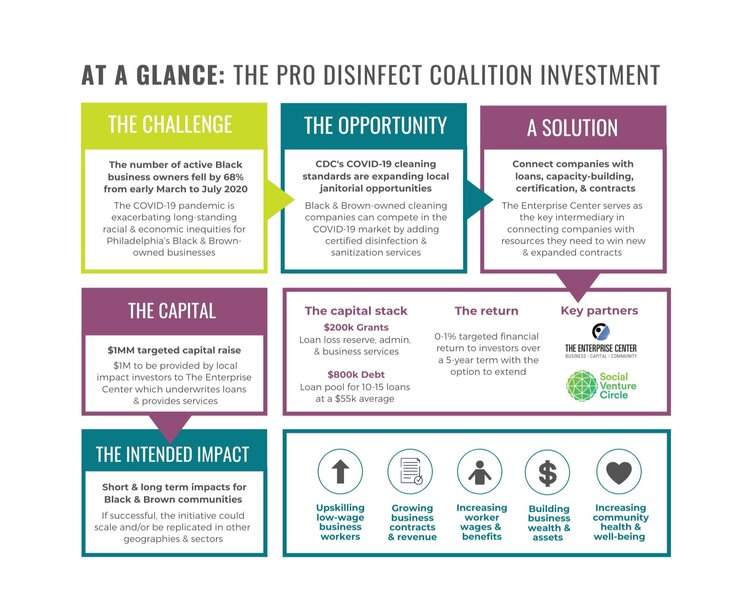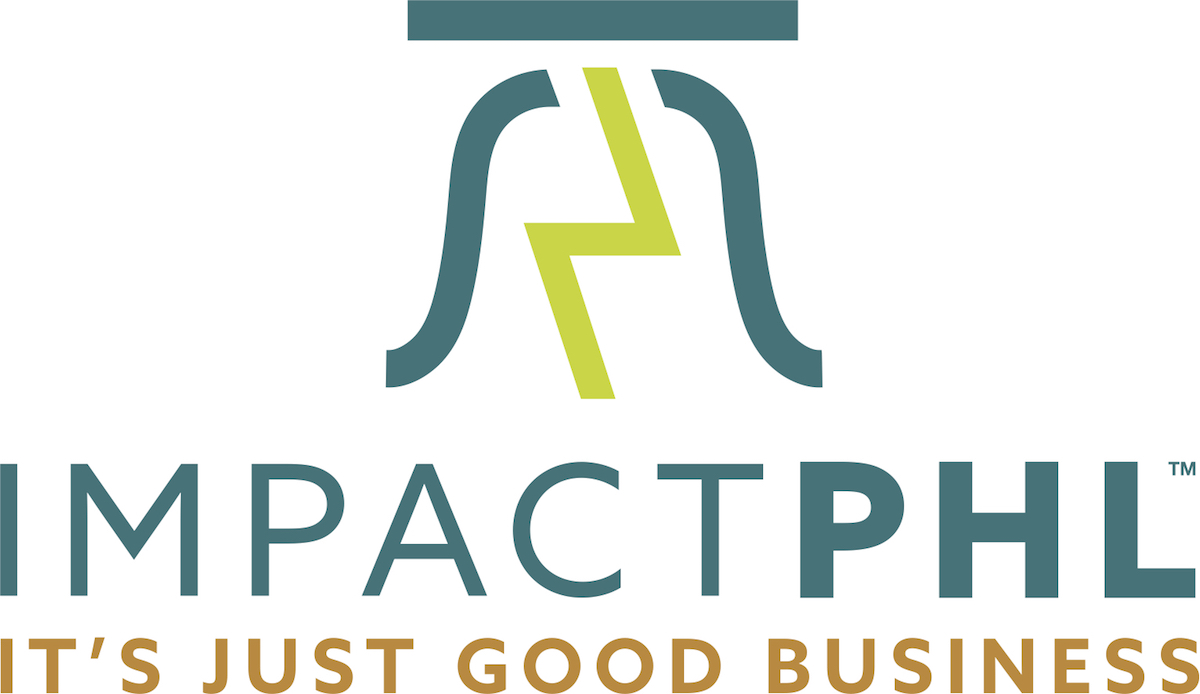When COVID-19 struck Philadelphia, the number of Black and Brown business owners fell by 68% from early March to July, compared to 44% of white businesses, creating a significant setback in the pursuit of racial equity in our local business landscape.
As growing economic inequalities and racial justice demonstrations converged, against the backdrop of a pandemic, The Enterprise Center in West Philadelphia presented a solution: the Pro Disinfect Coalition. The $1 million initiative’s aim? To transform traditional Black and brown janitorial and cleaning businesses into certified disinfectors positioned to receive investment and win new contracts in a COVID-19 world.
While Pro Disinfect seeks a very specific outcome, it simultaneously holds potential as a replicable and scalable model for racial equity as local stakeholders reimagine and rebuild Philadelphia’s $490 billion economy. Two nascent opportunities to increase capital access for local Black and brown businesses have yet to be fully realized — anchor institution procurement, and a growing impact investor community seeking to invest for racial justice in the Philadelphia region.
The success of the Pro Disinfect — and models like it — undoubtedly depends on market conditions, committed stakeholders, and cooperation toward a common goal. In this case, that goal is closing the business ownership gap where Black and brown communities make up more than half of Philadelphia’s population, yet own just 13% of businesses — a 2019 stat that has undoubtedly been accelerated by COVID-19. Closing the gap will produce ripple effects that not only benefit Black and brown communities, but the entire city — from wealth creation to improved health, thriving neighborhoods to a robust local economy.
Committed stakeholders for success: anchors, intermediaries and investors

Social Venture Circle’s John Moore. (Courtesy photo)
Philadelphia’s anchor institutions hold a key piece to the Pro Disinfect Coalition’s puzzle. In 2019, seven anchor institutions alone identified $25,334,986 in aggregate procurement dollars spent on janitorial services. With just 26% of that spend classifying as “diverse” and 19% as “local,” the anchors have room for growth to hit the City of Philadelphia’s suggested 32% minority business enterprise (MBE) participation. In 2020, COVID-19 amplified the market opportunity as everyone — from anchor institutions to local schools, restaurants, and churches — evaluated their cleaning practices in compliance with the CDC’s COVID-19 standards.
Intermediaries serve Philadelphia’s Black and brown business community with everything from capital to business expertise, physical space to networks. With more than 31 years of unparalleled experience, The Enterprise Center will support the Pro Disinfect Coalition by underwriting loans, providing back-office support for businesses, making procurement connections, providing capacity building, and more. Perhaps most important is The Enterprise Center’s commitment to centering and elevating Black and brown voices, lived experiences and goals. Its team harbors the cultural competency, respect and trust necessary to successfully work with Black and brown business owners and communities.
A third necessary stakeholder is impact investors — investors that seek the outcome of racial justice (or other impacts) alongside a financial return. Social Venture Circle, a national membership community of impact investors, touts its most active local network in the Philadelphia region. As an overwhelming need for COVID-19 response and recovery capital quickly swallowed traditional sources of funding (i.e. government funds, foundations, banks, etc.), impact investors have stepped up to move private capital in the form of deployed grants from donor-advised funds (DAFs) and 0% interest loans. Many are awakening to or actively advancing their racial consciousness and racial justice commitment.
Indeed, for Pro Disinfect to achieve success, the “who” and “what” are critical, but perhaps more important is the “how” in which the initiative is modeled. To produce different outcomes than Philadelphia has produced in the past, we must explore new lenses and prototype new approaches — from examining how market forces produce injustices to the ways in which things like implicit bias and power dynamics exacerbate them.

(Image by ImpactPHL)
Fortunately, pioneering initiatives, such as The Enterprise Center’s Innovate Capital Fund and The Philanthropy Network’s equity cohort here in Philadelphia, are modeling a path forward for systems change. As a majority-minority city, all stakeholders in Philadelphia have a paramount responsibility to walk — or perhaps sprint — that path on the ever-urgent issue of racial justice.
A capital case study: The Enterprise Center and Social Venture Circle
Seeking $1 million in capital for the Pro Disinfect Coalition, The Enterprise Center partnered with Social Venture Circle to raise patient capital in the form of grants and 0% interest loans. With capital and services administered by The Enterprise Center, the grant dollars will fund a loan loss reserve and business services (i.e. capacity building, certification training, business development), while the loan pool will be invested as patient capital into approximately 10 Black and brown-owned businesses in Philadelphia or the Greater Philadelphia region. Loans will be approximately $55,000 on average, with 0 to 2% interest, over a five-year term with the option to extend.
The investment is designed to build a bridge toward solving a problem — it’s low risk (The Enterprise Center has a less than 4% default rate) and low return, but has a high impact reward. If successful, the Pro Disinfect coalition has the opportunity to create layers of direct and indirect positive outcomes. Workers will have the opportunity to “skill up” and earn increased wages and benefits. Cleaning businesses will increase their capacity, services, reputation and revenue. Business owners will grow their business, and consequently, their wealth and assets. To-date, $500,000 of the $1 million has been raised with a target close date of February 2021.
PAGE Capital: connecting Black and brown businesses to impact investors
Encouraged by The Enterprise Center’s pioneering local work to connect Black and Brown businesses with “contracts, capacity, and capital,” the Economy League of Greater Philadelphia launched Philadelphia Anchors for Growth and Equity (PAGE) in 2018 to bring more resources to bear to this strategic ecosystem opportunity. PAGE consists of three core elements — PAGE R&D, PAGE Prep and PAGE Capital.
PAGE Capital — facilitated by Social Venture Circle and ImpactPHL — seeks to connect impact investors to local investment opportunities in PAGE businesses, businesses that are poised to win large anchor contracts. Impact investing, with a global market size of $715 billion, has rising interest in the Philadelphia region. A 2019 landscape scan by Urbane Development reported that 66% of survey respondents already make impact investments, while 69% of those who don’t are interested in learning more.
###
As existing capital networks are strained in the aftermath of COVID-19, we have the potential to cultivate a new network of impact investors to move untapped private capital off the sidelines. From philanthropists to family offices, foundations to VCs, investors are looking differently at their wealth and assets. Bearing witness to grave racial injustices, and the importance of place-based social and economic resilience when collective crisis strikes, many seek to move capital from bank accounts and mutual funds into local Black and brown initiatives and businesses.
The Pro Disinfect Coalition serves as just one prototype for what’s possible with PAGE Capital, and seeks to be the first of many to come. And really, we have no other choice. For Philadelphia to thrive, our Black and brown communities must thrive. For our Black and brown communities to thrive, we must invest in new ways for racial justice.

This essay was originally published via ImpactPHL Perspectives, a multi-part series which explores the many facets of the impact economy in Greater Philadelphia from the perspectives of its doers, movers, shakers and agents of change. This version has been edited for style.
Before you go...
Please consider supporting Technical.ly to keep our independent journalism strong. Unlike most business-focused media outlets, we don’t have a paywall. Instead, we count on your personal and organizational support.
Join our growing Slack community
Join 5,000 tech professionals and entrepreneurs in our community Slack today!

The person charged in the UnitedHealthcare CEO shooting had a ton of tech connections

From rejection to innovation: How I built a tool to beat AI hiring algorithms at their own game

Where are the country’s most vibrant tech and startup communities?


